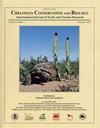中国绿龟(Chelonia mydas)遗传种群组成的区域保护意义
IF 0.8
4区 生物学
Q3 ZOOLOGY
引用次数: 12
摘要
摘要海龟在全球范围内濒临灭绝,面临着直接捕捞、副渔获物和栖息地退化等人为威胁。基因研究有助于确定筑巢地和觅食地之间的连通性,以进行保护和管理。然而,关于华南地区(包括香港、广东省和台湾)绿海龟(Chelonia mydas)遗传种群组成的信息非常有限。在本研究中,基于绿海龟(n=110)760bp线粒体DNA(mtDNA)控制区的混合种群分析显示,太平洋中有助于华南地区绿海龟聚集的主要来源是马来西亚半岛、密克罗尼西亚联邦的雅普岛、印度尼西亚的阿鲁岛、苏禄海、婆罗洲东北部,马绍尔群岛共和国,台湾的万安,以及日本的中部琉球和Yaeyama。这项研究首次调查和报告了该地区相对大量觅食绿海龟的来源筑巢种群。遗传结果还表明,从台湾和中国大陆的筑巢海滩孵化的群岛相绿海龟可能会利用广东沿海、台湾海峡和东海作为栖息地。作为有效保护海龟的预防措施,需要保护和管理华南地区每一个不同的绿海龟来源地以及来自多个出生地的觅食群落,以保护该物种的遗传多样性。应对筑巢、觅食栖息地和迁徙路径面临的人为威胁,如贸易和渔业的直接影响,进行彻底评估,并通过区域合作有效缓解,以维持这些种群。本文章由计算机程序翻译,如有差异,请以英文原文为准。
Regional Conservation Implications of Green Turtle (Chelonia mydas) Genetic Stock Composition in China
Abstract Sea turtles are globally endangered and face anthropogenic threats, such as direct harvest, bycatch, and habitat degradation. Genetic studies help identify connectivity between nesting and foraging grounds for conservation and management. However, information on genetic stock composition of green turtles (Chelonia mydas) in the South China Region (including Hong Kong, Guangdong Province, and Taiwan) is severely limited. In this study, mixed stock analysis based on the 760-bp mitochondrial DNA (mtDNA) control region of green turtles (n = 110) revealed that the primary source rookeries in the Pacific contributing to foraging green turtle aggregations in the South China Region were Peninsular Malaysia, Yap in the Federated States of Micronesia, Aru of Indonesia, Sulu Sea, northeastern Borneo, Republic of Marshall Islands, Wan-an of Taiwan, and the central Ryukyu and Yaeyama of Japan. This study is the first to investigate and report the source nesting populations of a relatively large number of foraging green turtles in the region. The genetic results also indicate possible use of coastal Guangdong, the Taiwan Strait, and the East China Sea as habitat by pelagic-phase green turtles hatched from nesting beaches in Taiwan and mainland China. As a precautionary approach for effective sea turtle conservation, conservation and management of each distinct green turtle source rookery as well as foraging aggregations sourced from multiple natal origins in the South China Region is needed to preserve genetic diversity for the species. Anthropogenic threats to nesting and foraging habitats and migratory pathways, such as direct take for trade and fishery impacts, should be thoroughly assessed and effectively mitigated by regional collaboration to sustain these populations.
求助全文
通过发布文献求助,成功后即可免费获取论文全文。
去求助
来源期刊
CiteScore
1.70
自引率
14.30%
发文量
17
审稿时长
>12 weeks
期刊介绍:
Chelonian Conservation and Biology is a biannual peer-reviewed journal of cosmopolitan and broad-based coverage of all aspects of conservation and biology of all chelonians, including freshwater turtles, marine turtles, and tortoises. Manuscripts may cover any aspects of turtle and tortoise research, with a preference for conservation or biology. Manuscripts dealing with conservation biology, systematic relationships, chelonian diversity, geographic distribution, natural history, ecology, reproduction, morphology and natural variation, population status, husbandry, community conservation initiatives, and human exploitation or conservation management issues are of special interest.

 求助内容:
求助内容: 应助结果提醒方式:
应助结果提醒方式:


